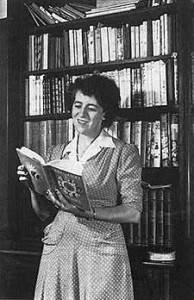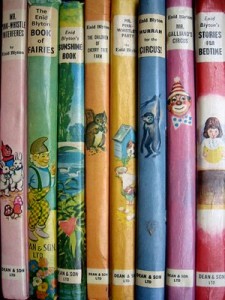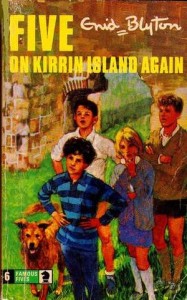By Debbie Burke
1927 was a watershed year in motion picture history.
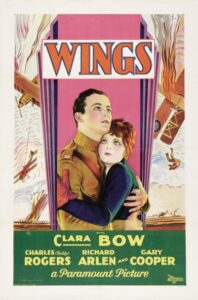 Wings won the first Academy Award for Best Picture.
Wings won the first Academy Award for Best Picture.
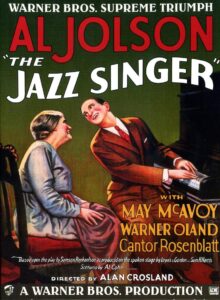
“Wait a minute…wait a minute…you ain’t heard nothin’ yet.”
Those were the first words ever spoken in a motion picture. Although The Jazz Singer is now considered insensitive, nevertheless, it stands as an historic moment in 1927 when the first “talkie” rang the death knell for the silent film era.
You can listen to a clip of Al Jolson’s first words here.
January 1, 2023 was Happy Public Domain Day when copyrights ended for movies, literary works, and music published in 1927.
Here’s a partial list of works that are now in the public domain, provided by Duke University.
Literary:
Herbert Asbury, The Gangs of New York
Willa Cather, Death Comes for the Archbishop
Agatha Christie, The Big Four
Countee Cullen, ed., Caroling Dusk: An Anthology of Verse by Black Poets of the Twenties
 Franklin W. Dixon, The Tower Treasure (The Hardy Boys #1)
Franklin W. Dixon, The Tower Treasure (The Hardy Boys #1)
Franklin W. Dixon, The House on the Cliff (The Hardy Boys #2)
Franklin W. Dixon, The Secret of the Old Mill (The Hardy Boys #3)
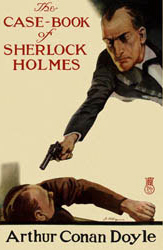 Arthur Conan Doyle, “The Adventure of the Veiled Lodger” and “The Adventure of Shoscombe Old Place,” the last two stories from The Case-Book of Sherlock Holmes (which means Holmes himself is now in the public domain)
Arthur Conan Doyle, “The Adventure of the Veiled Lodger” and “The Adventure of Shoscombe Old Place,” the last two stories from The Case-Book of Sherlock Holmes (which means Holmes himself is now in the public domain)
E.M. Forster, Aspects of the Novel
Ernest Hemingway, Men Without Women
Hermann Hesse, Steppenwolf
Franz Kafka, Amerika
Anita Loos, But Gentlemen Marry Brunettes
Edith Wharton, Twilight Sleep
Thornton Wilder, The Bridge of San Luis Rey
Virginia Woolf, To the Lighthouse
Films:
Metropolis (directed by Fritz Lang)
The Jazz Singer (the first feature-length film with synchronized dialogue; directed by Alan Crosland)
Wings (winner of the first Academy Award for outstanding picture; directed by William A. Wellman)
Sunrise (directed by F.W. Murnau)
The Lodger: A Story of the London Fog (Alfred Hitchcock’s first thriller)
The King of Kings (directed by Cecil B. DeMille)
London After Midnight (now a lost film; directed by Tod Browning)
The Way of All Flesh (now a lost film; directed by Victor Fleming)
7th Heaven (inspired the ending of the 2016 film La La Land; directed by Frank Borzage)
The Kid Brother (starring Harold Lloyd; directed by Ted Wilde)
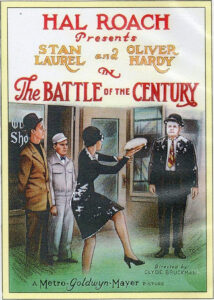 The Battle of the Century (starring the comedy duo Laurel and Hardy; directed by Clyde Bruckman)
The Battle of the Century (starring the comedy duo Laurel and Hardy; directed by Clyde Bruckman)
Upstream (directed by John Ford)
Music:
The Best Things in Life Are Free (George Gard De Sylva, Lew Brown, Ray Henderson; from the musical Good News)
(I Scream You Scream, We All Scream for) Ice Cream (Howard Johnson, Billy Moll, Robert A. King)
Puttin’ on the Ritz (Irving Berlin)
Funny Face and ’S Wonderful (Ira and George Gershwin; from the musical Funny Face)
Can’t Help Lovin’ Dat Man and Ol’ Man River (Oscar Hammerstein II, Jerome Kern; from the musical Show Boat)
Back Water Blues, Preaching the Blues, Foolish Man Blues (Bessie Smith) Listen here.
Potato Head Blues, Gully Low Blues (Louis Armstrong)
Rusty Pail Blues, Sloppy Water Blues, Soothin’ Syrup Stomp (Thomas Waller)
Black and Tan Fantasy and East St. Louis Toodle-O (Bub Miley, Duke Ellington)
Billy Goat Stomp, Hyena Stomp, Jungle Blues (Ferdinand Joseph Morton)
My Blue Heaven (George Whiting, Walter Donaldson)
Diane (Erno Rapee, Lew Pollack)
Mississippi Mud (Harry Barris, James Cavanaugh)
~~~
Of particular interest to mystery authors, the last two works by Arthur Conan Doyle featuring Sherlock Holmes are now in the public domain. What does this mean to writers?
If you’ve always hankered to feature the iconic Sherlock as a character in new adventures, you are free to do so without violating copyright or worrying about legal repercussions (more on that in a moment).
Here are a few genre possibilities:
Sherlock uses his powers of deduction to solve contemporary mysteries in the 21st century;
Or he time-travels through history in pursuit of villains;
Or fantasy stories might bestow magical superpowers like flying, turning invisible, telekinetically moving objects, and casting spells;
Or sci-fi, where he travels to distant universes—a rocket ship or space station makes a great setting for a locked room mystery;
Or for romantic suspense, he can fall in love.
Although a number of contemporary works have featured Holmes and Watson, there is a copyright backstory that’s nearly as complicated as Conan Doyle’s mysteries.
Even though Sherlock and Watson had already entered the public domain, legal battles over Sherlock’s copyright persisted for years. The Conan Doyle estate claimed various justifications to charge licensing fees to authors and film makers who wanted to use the characters.
Most creators paid the fees rather than endure the time and expense of taking the estate to court. But attorney Leslie Klinger fought back and won.
In one suit, Judge Richard Posner criticized the estate’s “unlawful business strategy” and stated:
The Doyle estate’s business strategy is plain: charge a modest license fee for which there is no legal basis, in the hope that the ‘rational’ writer or publisher asked for the fee will pay it rather than incur a greater cost, in legal expenses, in challenging the legality of the demand.
The expiration of the copyright on the last two works featuring Sherlock has now ended any possible claims by the estate.
Sherlock is finally, unquestionably free for any creator to use.
That means, as to Sherlock’s future adventures…you ain’t heard nothin’ yet.
~~~
Just for fun, here’s The Battle of the Century, featuring Laurel and Hardy and the greatest custard pie fight of all time:
~~~
TKZers: Do any stories, movies, or songs from 1927 make your creative juices flow?
Do you have ideas for repurposing works that are now in the public domain?
Please share your ideas in the comments.


